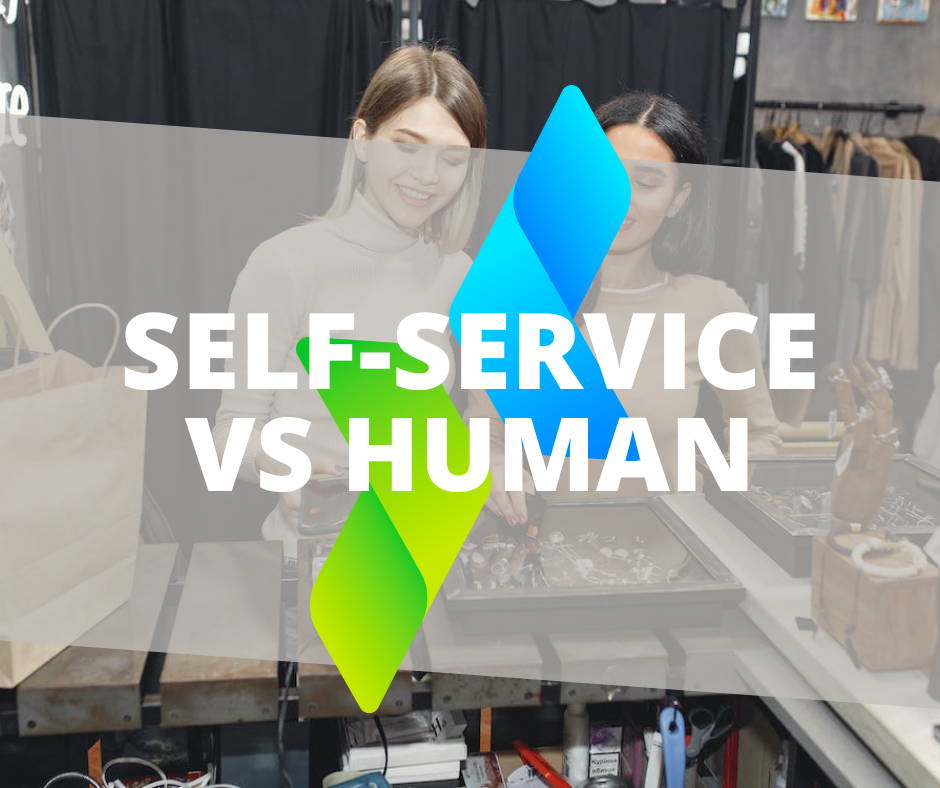This blog post detail the pros of Self-Service vs Human Interaction and show how you can find a balance that works for you and your business.
In recent years, the rise of self-service checkouts in retail stores has sparked a debate about the benefits and drawbacks of automated systems versus traditional human interactions. While self-service checkouts offer convenience and efficiency, some argue that they sacrifice the personal touch and customer service that human cashiers provide.

The Rise of Self-Service Checkouts
Self-service checkouts have become increasingly prevalent in retail environments, ranging from grocery stores to big-box retailers. These automated systems allow customers to scan and pay for their items without the need for human assistance, often reducing checkout times and streamlining the overall shopping experience.
Pros of Self-Service Checkouts
1) Efficiency
Self-service checkouts can expedite the checkout process, especially during peak hours when traditional checkout lines may be long. Customers can complete their purchases quickly, leading to higher throughput and reduced wait times.
2) Cost Savings
Implementing self-service checkouts can result in cost savings for retailers by reducing the need for cashier labour. With fewer employees required to operate checkout lanes, retailers can allocate resources more efficiently.
3) Empowerment
Some customers appreciate the autonomy and control offered by self-service checkouts. They can scan and bag their items at their own pace, without feeling rushed or dependent on a cashier.
Pros of Human Interaction:
While self-service checkouts offer undeniable benefits, they also present challenges and limitations compared to traditional human interaction at the checkout counter.
1) Personalised Service
Human cashiers can provide personalised assistance and engage in meaningful interactions with customers. They can offer product recommendations, address inquiries, and resolve issues promptly, enhancing the overall shopping experience.
2) Customer Satisfaction
Positive interactions with friendly and attentive cashiers can significantly impact customer satisfaction and loyalty. Human interaction fosters a sense of trust and connection, leading to repeat business and positive word-of-mouth referrals.
3) Problem Solving
In situations requiring special attention or assistance, human cashiers excel at problem-solving and adapting to unique customer needs. They can handle complex transactions, process returns or exchanges, and resolve technical issues more effectively than automated systems.

Finding the Balance
While the debate between Self-Service vs Human Interaction continues, many retailers are finding ways to strike a balance between automation and personal service to meet the diverse needs of their customers.
Strategies for Success:
Hybrid Approach
Some retailers offer a combination of self-service and staffed checkout lanes to cater to different customer preferences. This hybrid approach allows customers to choose the checkout method that best suits their needs while ensuring that assistance is readily available when required.
Investing in Training
For retailers opting for human interaction, investing in cashier training programs is essential to ensure that staff members possess the necessary skills to deliver exceptional customer service. Training should focus on communication, problem-solving, and product knowledge.
Continuous Improvement
Retailers should regularly evaluate and optimise their checkout processes based on customer feedback and market trends. This includes identifying pain points, addressing bottlenecks, and implementing technology solutions to enhance efficiency without compromising service quality.

In conclusion, the debate over self-service checkouts versus human interaction in retail is nuanced, with valid arguments on both sides. While self-service checkouts offer convenience and efficiency, human interaction provides a personalised touch and fosters customer loyalty.
Ultimately, the most successful retailers are those that strike a balance between automation and human service, leveraging technology to streamline operations while prioritising meaningful customer experiences. By understanding the unique needs and preferences of their customers, retailers can create checkout experiences that drive satisfaction, loyalty, and long-term success.
Get in touch with us now to discuss your options of Self-Checkout in your stores


